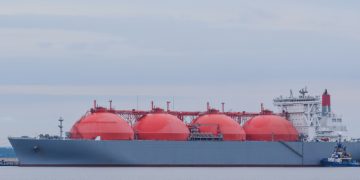Mimi Schuppler, Director of Engagement and Human Sustainability at VIKAND, believes in the power of small changes that, over time, can result in significant improvements. To enhance her overall well-being, she has started investing in activities that replenish her physical, mental, and emotional energy.
In the context of the maritime industry, she advocates for a comprehensive approach to boost maritime well-being. Mimi emphasizes the importance of maritime stakeholders prioritizing mental health through awareness programs, investments in health education and technology. Additionally, she stresses the significance of creating onboard opportunities for social connections and personal engagement, integrating learning and hobbies to promote inclusion.
SAFETY4SEA: What does ‘wellness’ mean to you? What do you do in your everyday life to embrace wellness?
Mimi Schuppler: Wellness, to me, reflects my state of balance in life. I embrace it holistically, understanding it’s a work in progress. I try to start each day with intention and exercise. I prepare healthy, homecooked meals to enjoy with my family and get outdoors with daily dog walks as a break from working from home. When possible, I combine these activities with reaching out to connect with someone important to me or listening to podcasts or online courses related to my work. I also carve out time for volunteering to stay connected and give back to my community. Lastly, I set aside time for my own simple pleasures, which tend to be solitary pursuits like knitting, reading or Tai Chi to re-energize after a busy day and keep me grounded.
S4S: What are the two things to do that can make you feel happy after a challenging day?
M.Sch.: After a challenging day, my happiness recipe involves two key ingredients. First, cooking together with my family creates moments of joy, reminding me that challenges are just one part of life. Sharing laughter or playing games reinforces gratitude. Second, engaging in solitary and repetitive activities like knitting, gardening, or pottery allows me the time to process the day’s events and emotions independently, offering a personal sanctuary of reflection and rejuvenation.
S4S: What is the most worthwhile wellbeing investment (in energy, time, money) you’ve ever made?
M.Sch.: The most worthwhile well-being investment I’ve made as a working mom involves a shift in focus—redirecting energy towards self-care. Drawing from one of the takeaways from “Atomic Habits” by James Clear- Start small and get 1% better each day. Small changes can compound over time and lead to remarkable outcomes – I started to incrementally invest in activities that replenish my physical, mental and emotional energy, bring me personal joy and ultimately improve my wellbeing.
S4S: What do you do to keep balance between your personal and business life?
M.Sch.: Balancing personal and business life in a 24/7 global work environment, especially working from home, is a continuous challenge. Frankly, it’s a work in progress. I’ve found the following practices helpful to delineating my personal and business life:
- Dedicate my workstation for work and a laptop for personal use.
- LinkedIn for business and another social media account for personal use.
- Refrain from eating at my desk and enjoy meals at the dining table. Use this time to catch up with family or take a break from work.
- Establish evening routines, as I would for a team meeting, to actively engage and block out time with my family.
- Intentionally silence my phone and keep it at a distance for large blocks of time on weekends to resist the temptation to check and respond to non-urgent emails.
S4S: In the last five years, what new belief, behavior, or habit has most improved your personal life?
M.Sch.: The COVID pandemic created a pause for reflection on whether I was placing my time and energy in the areas most important to me personally.
- New habit – I make time to read each day, not social media feeds or online articles, but pages from an actual book.
- New behavior – I am learning to say no to things that do not align with my sense of purpose or will negatively affect my well-being. Just because I can, doesn’t mean I should.
- New belief – I do the best I can without sacrificing my beliefs and authentic self, and that is enough. I can be equally effective as a coach as opposed to a fixer.
S4S: What would you like to change in the current maritime landscape with regards to wellbeing?
M.Sch.: I advocate for a holistic approach to improve maritime wellbeing. To start, prioritize mental health through awareness programs and access to support groups or professionals, ensure reasonable working hours and rest periods, and invest in health education, leveraging technology for real-time health monitoring and personalization. It is equally important to create onboard opportunities for social connections and personal engagement that integrate learning and hobbies and promote inclusion.
S4S: What wellness-promoting initiatives would you like to see in the workplace?
M.Sch.: To foster a healthier, more adaptive and more fulfilling work environment for their people, companies could focus on improving existing systems that directly affect work-life balance. They could also support their employees’ personal journeys to achieving wellness by:
- Recognizing and accommodating unique, individual needs for overall wellness and balance, rather than offering a generic approach.
- Establishing a common framework for technology use with tools that enhance efficiency and work-life balance.
- Prioritizing flexibility and autonomy to empower employees.
S4S: What is your personal motto?
M.Sch.: Live authentically while extending kindness. Lean into discomfort to fuel your growth.
The views presented hereabove are only those of the author and do not necessarily reflect those of SAFETY4SEA and are for information sharing and discussion purposes only.



























































